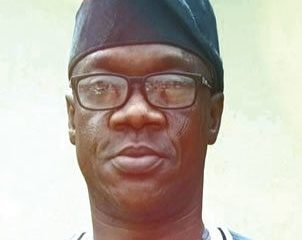News
OPINION: For Yoruba Muslims And Pentecostals
Published
2 weeks agoon
By
Editor
By Lasisi Olagunju
The audience at the 1903 (third year) lecture of the Royal African Society in London listened with rapt attention as African nationalist, Dr. Edward Blyden, took them back to antiquity when “the most enlightened nations of Greece, Asia, and Egypt” held the opinion that “God revealed himself only in Africa.” Great men of that period, including Alexander the Great, rushed to the great oracle of Africa to drop offerings and “learn the will of God.” A few centuries after that epoch, Blyden lamented, Africa, the “first home of God” where He “buried His great truths” had travelled full circle and had come to be identified by the ‘civilised’ world of the 19th century as “the last home of the devil.”
“Now, things have so changed that it is the opinion of some that God is everywhere except in Africa,” Blyden agonized in the lecture which was on ‘West Africa before Europe.’ He went on to predict that “Africa’s turn will be sure to come again” when it would reclaim its place as the “refuge for seers who see and for prophets who prophesy.” Blyden said when that time would have come, an utterly materialized and exhausted Europe would go back to Africa to learn about God. The lecture is in the July 1903 edition of the Journal of the Royal African Society, Volume 2.
Just a hundred years after that lecture, the Blyden prophecy has come true. We’ve reclaimed our place as “the first home of God”. Nigeria, which houses the highest percentage of Africa’s population, qualifies to be celebrated as the global “refuge for seers who see and for prophets who prophesy.” Across faiths, we incubate and hatch men of God and gods of men – in their thousands. We speak and act for God here without counting the costs.
There is something cool about setting precedents. The immediate past Oyo State Governor, the late Abiola Ajimobi, won a second term election in 2015 and pronounced himself Koseleri (it-has-never-happened-before). Nigerians enjoyed an unprecedented three-day leave from work last week. In some places, the holiday lasted the whole of the week. The abstinence from work was the country’s way of celebrating Muslims’ 30 days of total abstinence from day-time meals – and from all sins. Allowing one abstinence to provoke another abstinence made all of us pious and sinless. It was surreal. The holiday should have endured till eternity.
While the holiday lasted, some friends shared their sallah experiences with me. They thought another koseleri was happening in Yorubaland: their pentecostal Christian neighbours refused to eat their food. “They said it was sin to share in our feast,” one of them said, sadly. “That was not who we are”, another added. I told them it is not really a new strain in Yoruba Christianity. I have RCCG and Deeper Life friends who celebrate and dine with me during Ileya. I also have RCCG and Deeper Life friends in whose mouths our good old eran Ileya (sallah ram meat) has lost its holiness. The twists started before the close of the last century when pentecostal Christianity came in costumes of fundamentalism.
READ ALSO: OPINION: FG’s N90 Billion Hajj Politics
Can the Yoruba Christian really avoid sharing things Islamic? If you are a pentecostal Yoruba Christian and you will see it as a sin to celebrate the next Sallah with me, what you will need to throw away will be more than my food. You will stop praying entirely in Yoruba because almost all the key words in the established Christian payers are taken from Arabic/Islamic texts. You will stop calling prayer ‘adura’ because it is from the Muslim ‘Du’a’. You will stop using the word ‘aanu’ (mercy) because the word is rooted in an Arabic word. A new word has to be coined for alafia (peace, wellbeing) because its root is also Arabic. Sermon will stop being called ‘iwaasu’ because it is from the Arabic ‘wa’z’. You will, furthermore, need to change your wardrobe and come up with new designs beyond what you call Yoruba dresses.
British Africanist J.D.Y. Peel’s ‘Christianity, Islam and Orisa Religion’ published in 2016 addresses some of these on pages 162 and 163. It says the agbada dress which you proudly assert as yours is a donation from Islam, perhaps from persons more northerly than northern Nigerians. Anglican missionary, Henry Townsend, in 1847 saw agbada’s acceptance and growing popularity and wrote that the “Mohammedan costume is become very fashionable with the young and gay” and “is by no means put on as a religious peculiarity.” If you read David Heathcote’s ‘The Embroidery of Hausa Dress (1977), cited by R.O.R. Kalilu’ (1997), you will have a clue that the embroidery (jakan) on your agbada “developed from Mali (and) is associated with Quranic scholars and teachers.” You must have heard the saying: Ise agbada kii se Imale (poverty of lack of agbada does not afflict a Muslim). I heard that from the genius of Yoruba Sakara music, Yusuf Olatunji.
There is no escaping the oneness of the world. Do the anti-Muslim pentecostal realize that Bible chapters and verses are numbered in Arabic numerals 1,2,3 etc. The word, ‘Algebra’ is from the Arabic al-jabr. Indeed, the whole “method of equation solving” in Mathematics is from Arabic.
When we speak about what Lord Lugard did with Southern and Northern Nigeria in 1914, we use the word ‘amalgamation.’ Scholars have agreed that ‘amalgamate’ descends from the Arabic al-malghama which means what ‘amalgam’ means.
In your everyday lives, you can’t escape words that have Arabic ancestors. The ‘sugar’ in your tea is from the Arabic word ‘sukkar’; cotton is from ‘qutum’, your overcoat got its ‘jumper’ name from the Arab’s ‘juppa.’ We can go on and on and conclude that it is pointless and fruitless for my Yoruba pentecostal friends to seek to run away from dining with Muslims and their Islam.
FROM THE AUTHOR: OPINION: Tinubu, Matter Don Pass Be Careful
Now, the insular Christian has ideological bedmates in Yoruba Islam. There is this Imam in Ogbomoso shown online last week emitting fire and pronouncing everyone outside Islam as hell-bound. His voice was divisively loud and his penal tongue baleful. I listened to him and wondered where he was coming from. I once discussed clerics like this with the late Alaafin of Oyo, Oba Lamidi Adeyemi. “Taa lo ko won ni kewu (who taught them Quran/Arabic?)” was the oba’s rhetorical response to our worries. True, we should ask questions of competence when we hear such papal pronouncement from supposedly learned people. What he said was not what my Mallam taught me in Madrasha. If God had willed, He would have made all of humanity to belong to one nation (see Quran 5:48; see Quran 42:8); and one religious community (Quran 16:93). But, in His wisdom, God didn’t; instead, “to every people”, he sent “an apostle” (Quran 10:47). The Yoruba forbid saying or hearing what that Imam said about other religions. It is unYoruba to speak the language of perdition – they say man is not God.
It is in the character of the Yoruba to celebrate persons who speak with decorum. The highly regarded, thoughtful Chief Imam of Offa, Alhaji Muhyiddin Husayn, was at a Laylatul Qadr event in Ogbomoso a few days to last week’s sallah. His sermon at the programme was a tour de force on how to have a calm sea of peace. I heard him warn against unguarded utterances. He told the Chief Imam of Ogbomoso to win acceptability with character and close his running tap of hot words: “It is when you stop uttering words that words will stop uttering themselves,” he told the Imam. He added that bad words can’t win wars: “if you’ve seen war before, you will fear war” and “war knows no friend.” He cited examples with his own ascendancy experience. “The years I spent warding off attacks were enough as a man’s full tenure,” he said. But, he added, you would win if your tongue is bridled, if you do right and respect elders and pay hate with love. “One can gain an office with force”, he counseled, “but it takes patience and wisdom to sit there in peace.” Words, they say, draw kola nut from the pocket and can also draw sword from the pouch. The consequence of not listening to reason is having one’s milk spilt and the mug broken.
Ask master-potters if refiring can make whole again a broken pot. It is there in the experience of our fathers that a pot once broken, cannot be mended. There are several lethal pronouncements in Yoruba history with the pot metaphor at the centre. That is why we emphasize peace and unity in all our affairs.
The story of Islam and the Yoruba is the story of how leaf becomes soap. Scholars from the earliest of times have always marveled at how the Yoruba seamlessly combine opposition and accommodation when it comes to religion and religious matters. Fundamentalist Christianity and radical Islam have neither comfortable bed nor cushion seat to relax and flourish in Yorubaland. And they won’t tomorrow. There is no family without both Muslim and Christian wings. In books and arts, we encounter moderation and cross-religious handshakes that emphasize the Yoruba moderation in matters of faith.
FROM THE AUTHOR: OPINION: Kumuyi, Tortoise And Looters Of Noodles
I read Gbadebo Gbadamosi’s ‘Odu Imale: Islam in Ifa Divination and the Case of Predestined Muslims’ published in the Journal of the Historical Society of Nigeria, June 1977. In it, I encountered discussions on Ifa verses which tell us of Yoruba Muslim clerics, “their dress, travels, and the patronage which they enjoy from the people.” Ifa speaks of “Babamale ‘Bewu gereje/ti yio fi gbogbo aye se ofe je (the Muslim man/ who wears voluminous garment/ who will have the whole world as free bounty).” I read Razaq Kalilu’s ‘Bearded Figure with Leather Sandals: Islam, Historical Cognition And the Visual Arts of The Yoruba’ ((1997). Here, the author asks the reader to note earlier works which suggest that Sango, the third Alaafin of Oyo, was “favorably disposed to Muslims” to the extent that he got an oriki: “Ogbori odo s’aluwala ‘male (He that sits on a mortar to perform ablution like the Muslim.”
Whether Christian, Muslim or nothing, humanity is one – or supposed to be one. One hundred and fifty nine years ago, Harvard-trained American scientist, Pliny Earle Chase (1820-1886), sought to use similar words and word-sounds found in Yoruba and other ‘world’ languages to prove what he called the “universal brotherhood” of man. In a 39-page seminal article published in an 1865 edition of the ‘Transactions of the American Philosophical Society,’ Chase did a painstaking comparison of some Yoruba words and word sounds with some others found in Arabic, Latin, Greek, English, Hebrew, Chinese, German, Coptic, Gothic, French, Dutch, Egyptian, Italian, Finnish, etc languages. He examined similarities in sound and meaning of prefixes, suffixes and midfixes found common across Yoruba and those other languages. He, in particular, draws our attention to what he calls “the marvelous grammatical affinity that exists between the Yoruba, Egyptian, and Coptic Languages.” Copiously using T.J. Bowen’s ‘Grammar and Dictionary of the Yoruba Language’, he argues that it could not have been mere fortuitous occurrence of coincidences that “auro” (owuro)- morning/dawn in Yoruba is “aurora” (dawn) in Latin, just as “awari” (search) in Yoruba shares sound and meaning with the English word “aware”. He writes that there is “oro” (wealth) in Yoruba just as its Latin sound-mate, “aurum”, means gold. Chase notes with considerable interest that the word ‘duro’ means “to stay” (or stand firm) in Yoruba, and ‘duro’ in Latin means hard, harden, toughen, become stern. Incidentally, I also found that there is a similar Hebrew word, ‘dura’ which, among others, means ‘endurance.’ Chase’s conclusion is that humanity is one vindicating the Biblical assertion that “God hath made of one blood all nations of men to dwell on all the face of the earth” (Acts, 17:26).
The world lounges under a fatal canopy. You should be following the escalated bloodshed in the Middle East. The standards and the double standard. It may still get worse. Just as it is in Shakespeare’s Julius Caesar, carrion birds are hooting at noon; ravens, crows and kites are flying above the “sickly” world. But, what we need is love to defeat war. And, we will have this if we are able to take care of the devil in race and religion. It is difficult. Daniel Defoe, in his ‘The True-Born Englishman’ (1701) writes that “Whenever God erects a house of prayer,/ The Devil always builds a chapel there; /And ’twill be found, upon examination (that) / The latter has the largest congregation.”
You may like


Bello And Enenche: A Tale Of Two Lions [OPINION]


OPINION: Why Were Miyetti Allah And Tinubu’s Iyaloja In Ibadan?


OPINION: Bobrisky’s Masque, Yahaya Bello’s Boa


OPINION: Onitiri-Abiola And The Madness In Ibadan


OPINION: Bobrisky And Our Other S/He Offsprings


OPINION: Flying Gods, Lying Prophets And Power Bandits
News
Ooni: Suspended Benin Palace Functionaries Banished
Published
12 mins agoon
April 29, 2024By
Editor
Six Oba of Benin palace functionaries have been ostracized.
The palace functionaries were said to have engaged themselves in a sacrilegious show of shame and falsehood against the Benin Custom and tradition.
The banished palace functionaries are Johnbull Igbinosun, Iduhonre (Ihogbe), S.E. Aigbiremwen, Efesoghoba (Ogbelaka) and two other Ogbelaka functionaries — Ogbeide Osagie and Osamudiame.
READ ALSO: Oba Of Benin Suspends Six Officials For Posing As Palace Emissaries To Ooni Of Ife
They had falsely claimed to be emissaries of the Omo N’ Oba N’ Edo Uku Akpolokpolo, His Royal Majesty, Ewuare Il, Oba of Benin in the palace of the Ooni of Ife, His Imperial Majesty, Oba Adeyeye Enitan Ogunwusi; (Ọjájá II), where they rendered a “disjointed account of the link between the Benin Royal Dynasty and the Ooni-ship of Ife at Ooni of Ife’s Palace in Osun State recently.”
A statement signed by Mr. Osaigbovo Iguobaro, Chief Press Secretary to the Oba of Benin on Monday April 29, 2024, said they admitted before a committee led by Chief Ekhoerovbiye Oviasogie, the Uwangue of Benin that they erred against Benin Customs.
READ ALSO: Tragedy In Ekiti As Man Stabs Wife To Death Over Infidelity
The Uwangue of Benin, who described their action as a deliberate attempt to rubbish Benin Kingdom, pronounced the suspension of the Palace functionaries.
Consequently, they were also stripped off of Benin Royal beads, recognition as palace functionaries and their traditional titles, which were handed over to the ancestors.
The suspended palace functionaries were also barred from parading themselves as Benin palace functionaries and stopped from participating in any traditional rites in Benin.
They were thereafter escorted out of the Palace by Chiefs, including Ewaise (traditional seers) with occipital horns invoked ancestral spirits to bear witness.
News
2024 UTME: 77% Of 1.8M Candidates Score Less Than 200
Published
1 hour agoon
April 29, 2024By
Editor
Seventy-seven per cent of the 1,842,464 candidates whose 2024 Unified Tertiary Matriculation Examination results were released by the Joint Admissions and Matriculation Board on Monday scored less than 200.
Giving a breakdown of the results of the 1,842,464 candidates released, the Board’s Registrar, Prof. Ishaq Oloyede noted that, “8,401 candidates scored 300 and above; 77,070 scored 250 and above; 439,974 scored 200 and above while 1,402,490 scored below 200.”
The Board is expected to announce the minimum benchmark for the 2024/2025 academic session admissions during its policy meeting to be held at a later date.
READ ALSO: 2024 UTME: JAMB Withholds Results Of 64,624 Candidates
Over the years the benchmark for admissions to universities has hovered around 180 to 200.
Oloyede also gave the new format for acceptance of admissions.
He said, “ Either a candidate sends ACCEPT/REJECT on his dedicated phone line to 55019/66019, or a candidate accepts or rejects any admission offer (programme change inclusive) with his/her fingerprint (biometric) at an accredited CBT centre or any JAMB Office.
“The above newly-crafted methods of accepting or rejecting admissions, are aimed at protecting the details of the candidates and upholding the sanctity of the admission process.
“With this new method, the candidates’ registered phone (SIM) is now more important than ever as it is now required to perform even more sensitive operations. We are in discussions with NCC on dedicated student’s SIM with restricted services.”
News
Libel: Delta Court Orders Linda Ikeji To Pay NBM N30m Damages
Published
1 hour agoon
April 29, 2024By
Editor
A Delta State High Court in Effurun has awarded N30 million damages against popular Nigerian blogger, Linda Ikeji, for a libellous publication against the Neo-Black Movement of Africa.
The lawsuit had Registered Trustees of NBM of Africa, Ese Kakor, Felix Kupa and Mayor Onyebueke as the Claimants against Linda Ikeji as Defendant.
In a ruling on Monday, in Suit No: EHC/210/2021, Presiding Justice Roli Daibo-Harriman, also ordered the absent Defendant, to pay N300,000 as being the cost of litigation.
The Defendant was further ordered to place a publication on her blog and national dailies retracting the libellous publication for which the NBM dragged her to the court, just as she is restrained from further damaging publications against the Claimants.
READ ALSO: Tribunal Restrains MultiChoice From hiking DStv, Gotv Subscription Rates
The NBM of Africa took to court action after she failed to honour a letter by the Claimant demanding retraction and apology over the libellous article published on her blog on Oct. 19, 2021.
The blogger in her publication of 19 October 2021 allegedly labelled the NBM of Africa as a dreaded cult group, black axe, and criminal organisation among other names.
The Claimants approached the court, praying for N1bn damages and an unreserved apology to be published on her blog and two national dailies among others.
Justice Daibo-Harriman, in her ruling, described the tags, including dreaded cultist group, black axe and criminal organisation as used in the Defendant’s publication as all defamatory.
Counsel to the Claimants, Kelvin Agbroko, noted that the ruling, “Will serve as a lesson to bloggers that it is not every item you publish. It is good to verify information before making a publication.
READ ALSO: Lagos, Ondo, Taraba Top In Highest Okada Fares In March – NBS
He said, “NBM of Africa is a legal organisation duly registered with the Corporate Affairs Commission. The publication made by the Defendant against my client has been cleared that it was a damaging publication.
“NBM is good to go, we are going to take all necessary steps to enforce the terms of the judgment against her. It was an erudite judgement that is all-encompassing and will be difficult to fault.”
President of the NBM of Africa, Ese Kakor said the outcome of the case had been on for about two years.
He said, “What Ikeji did was just to sell in a bid to defame the character of NBM of Africa. It is very wrong.
“I advised other bloggers not to follow the same steps as they may also face similar litigation. Do not try and defame peoples’ character. NBM has nothing to do with cultism, black axe. It is not a criminal organisation but a well-registered organisation.”

Ooni: Suspended Benin Palace Functionaries Banished

Travellers Beat Rivers Policewoman To Death

10 Facts About New Super Eagles Coach, Finidi George
Trending

 News4 days ago
News4 days agoEdo: FRSC Threatens Sanction On Truck Drivers Loading Goods, Passengers Together

 Headline4 days ago
Headline4 days agoSaudi Arabia Opens First Alcohol Store, Nigerian Muslims React

 Headline4 days ago
Headline4 days agoVIDEO: Meet Nigerian Pastor Who Predicted World Will End April 25

 News4 days ago
News4 days ago243 Passengers Cheat Death As Air Peace Plane Makes Emergency Landing At Lagos Airport

 Metro4 days ago
Metro4 days agoJUST IN: Four-year-old Boy Dies In Abuja School, Parents Suspect Foul Play

 Metro4 days ago
Metro4 days agoJUST IN: Protesters Storm APC Secretariat, Demand Ganduje’s Resignation

 Politics4 days ago
Politics4 days agoEdo Guber: PDP Unveils 200-member Campaign Council

 News3 days ago
News3 days agoDSTV Price Hike: Five Alternatives Nigerians Are Opting For

 News5 days ago
News5 days agoEFCC Withdraws Appeal Against Former Kogi Gov, Bello

 News4 days ago
News4 days agoJUST IN: Senator Ayogu Eze Is Dead






























